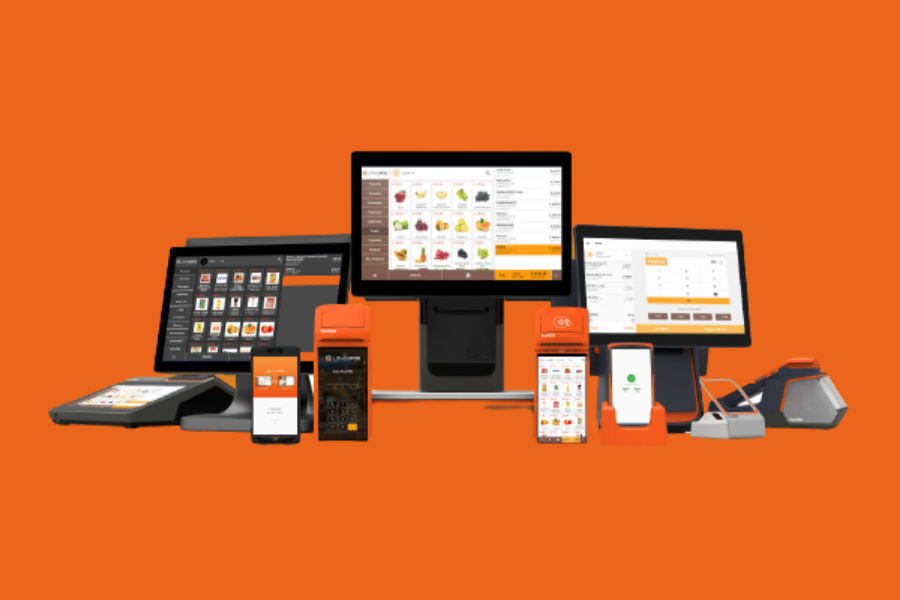Benefits of using Restaurant POS Software in 2025
Wiki Article
Comprehending the Relevance of POS Software Program in Modern Retail Operations
In today's retail landscape, the role of POS software application has ended up being increasingly considerable. These systems have actually changed from basic cash signs up to complex tools that improve various aspects of operations. They not only improve transactions but also give understandings that can form organization approaches. Comprehending how these systems influence consumer experience and supply administration is important for any type of store seeking to remain competitive. The effects of these developments require further expedition.The Advancement of POS Software Application: From Purchase Handling to Comprehensive Solutions
As retail atmospheres evolved, so also did the performance of Factor of Sale (POS) software program, which changed from fundamental transaction handling systems to advanced, all-encompassing services. POS systems primarily handled sales transactions, taking care of money signs up and printing receipts. With innovations in technology, these systems started incorporating supply administration, consumer relationship administration, and sales analytics. Retailers recognized the need for real-time data and smooth procedures, triggering the advancement of cloud-based POS remedies that permitted remote accessibility and enhanced scalability.Additionally, the rise of mobile commerce demanded POS systems to adapt, making it possible for transactions via smartphones and tablet computers. This improvement not just streamlined procedures however additionally improved reporting capabilities, permitting retailers to make educated decisions based on detailed information understandings. Modern-day POS software application has become integral to retail approach, offering as a multifunctional tool that sustains numerous functional aspects beyond plain purchase processing.
Enhancing Customer Experience Via Advanced POS Includes
While many stores concentrate on functional effectiveness, progressed POS attributes increasingly prioritize enhancing the client experience. Modern POS systems currently offer capabilities such as mobile repayment choices, customized promos, and customer loyalty programs, which cultivate an even more appealing shopping setting. By improving the checkout process, these systems lower wait times, allowing clients to complete deals swiftly and efficiently.Additionally, incorporated client partnership management (CRM) attributes make it possible for retailers to track purchasing choices and behaviors, assisting in tailored marketing efforts. This personalization not only constructs customer commitment however additionally boosts total satisfaction.Moreover, progressed analytics given by POS systems can help retailers understand customer patterns and choices, enabling them to make enlightened decisions about item offerings and shop formats. Eventually, the focus on customer experience with sophisticated POS features not only meets modern customer expectations yet also drives repeat business and enhances revenue for retailers.Simplifying Inventory Administration With Integrated POS Systems
Integrated POS systems play an important role in enhancing supply monitoring by automating procedures that commonly required considerable hand-operated effort (Restaurant POS Software). These systems enable retailers to track supply degrees in real time, removing discrepancies that often emerge from manual supply matters. With features such as barcode scanning and automated stock replenishment alerts, organizations can maintain ideal inventory levels without overstocking or stockouts.Furthermore, incorporated POS systems help with exact projecting by analyzing historical sales information, enabling sellers to make enlightened buying decisions. This anticipating ability helps organizations adjust to changing customer demands and seasonal fads more effectively.Additionally, the centralization of stock data throughout numerous sales channels improves exposure, enabling sellers to manage their stock extra successfully. Ultimately, the combination of POS systems into supply administration streamlines procedures, reduces human error, and adds to increased earningsReal-Time Sales Tracking and Reporting for Informed Decision-Making
Accurate inventory administration prepares for efficient sales monitoring and reporting. Real-time sales tracking makes it possible for stores to monitor sales performance as it happens, supplying instant insights right into consumer purchasing patterns and trends. This capacity allows companies to respond swiftly to variations sought after, enhancing supply degrees and lessening overstock or stockouts.Moreover, integrated POS systems promote the generation of comprehensive records, highlighting essential metrics such as sales by classification, amount of time, and individual products. Such reporting abilities encourage retailers to make data-driven decisions, identifying effective strategies and locations requiring improvement.
The Duty of POS Software Program in Consumer Relationship Administration
POS software program plays a vital role in boosting consumer connection administration by enabling sellers to implement individualized marketing methods. By assessing consumer information, companies can customize promotions and communications to fulfill private choices. Additionally, these systems facilitate the development of enhanced commitment programs that urge repeat organization and strengthen consumer interaction.Personalized Advertising And Marketing Approaches
As retailers significantly look for to improve consumer commitment and engagement, customized advertising and marketing techniques have actually arised as a crucial component of reliable customer relationship management. POS software application plays an important function in this procedure by accumulating and evaluating client information, allowing retailers to tailor advertising efforts to individual choices and purchasing habits. By leveraging understandings from purchase backgrounds, retailers can develop targeted promos and individualized communications that resonate with customers, promoting a much deeper link. In addition, the assimilation of POS software with client connection management systems allows for smooth monitoring of consumer communications, making certain that advertising and marketing strategies stay appropriate and timely. This data-driven approach not just enhances consumer complete satisfaction but likewise drives sales and encourages repeat organization, solidifying the store's market setting.Improved Loyalty Programs
Retailers are increasingly recognizing the relevance of loyalty programs in cultivating long-term customer partnerships and improving general engagement. POS software plays an essential function in the development and administration of these programs, enabling sellers to track client acquisitions, habits, and preferences effectively. By leveraging information analytics, businesses can develop customized benefits and incentives that reverberate with specific customers, consequently raising participation in loyalty programs. Furthermore, POS systems make it possible for seamless integration with mobile apps and electronic systems, facilitating easy access to promos and benefits. This not just boosts consumer fulfillment yet also drives repeat company. Inevitably, POS software program empowers stores to cultivate much deeper connections with their customers, changing periodic shoppers into devoted clients via targeted and significant interaction approaches.Incorporating POS Equipments With Shopping Platforms for Omnichannel Success
To accomplish real omnichannel success, seamless assimilation between point-of-sale (POS) systems and e-commerce platforms is read more essential. This combination permits stores to link their inventory administration, ensuring that product accessibility is accurately mirrored throughout both online and physical shops. Clients gain from a natural purchasing experience, where they can conveniently switch over in between channels without encountering discrepancies.Furthermore, incorporated systems facilitate real-time information sharing, enabling services to examine client habits and preferences better. This data-driven technique permits merchants to tailor marketing strategies and maximize supply levels, ultimately enhancing client contentment and driving sales.Additionally, the ability to process deals across platforms simplifies procedures, reducing the risk of mistakes and improving general performance. As sellers increasingly adopt omnichannel methods, the integration of POS systems with shopping systems continues to be a critical factor in accomplishing sustainable development and keeping affordable benefit in the dynamic retail landscape.
Future Patterns in POS Modern Technology and Their Impact on Retail Operations
As retail operations develop, future patterns in POS modern technology are readied to improve the landscape considerably. The increase of cloud-based remedies, technologies in mobile POS systems, and the benefits of AI integration are among the essential advancements prepared for to boost performance and customer experience. These innovations assure to enhance processes and cultivate a more dynamic retail atmosphere.Cloud-Based Solutions Surge
With the boosting dependence on modern technology, cloud-based POS solutions are changing retail procedures by offering boosted adaptability and scalability. These systems make it possible for retailers to accessibility real-time information from anywhere, helping with much better decision-making and client service. By leveraging cloud facilities, organizations can reduce ahead of time prices connected with software and Restaurant POS Software hardware installations while ensuring seamless updates and maintenance. Additionally, cloud-based services sustain multi-location monitoring, allowing stores to integrate supply and sales throughout different outlets easily. This adaptability is vital in today's fast-paced market, where customer preferences change quickly. As even more sellers adopt these solutions, they can expect improved functional effectiveness and a much more responsive approach to market needs, inevitably improving client fulfillment and commitment.
Mobile POS Innovations
The here development of retail modern technology remains to form procedures, especially with the surge of mobile POS developments. These systems allow stores to process transactions anywhere within the store, enhancing customer involvement and improving check out procedures. Mobile POS remedies boost inventory monitoring by permitting instant accessibility to supply levels, aiding personnel help customers more efficiently. Additionally, they help with tailored shopping experiences with incorporated customer data and loyalty programs. As smart phones come to be increasingly innovative, retailers are taking on functions such as electronic receipts and contactless payments, furthermore optimizing the buying trip. The shift in the direction of mobile POS not only increases functional performance yet likewise straightens with the growing customer preference for ease, guaranteeing that retailers continue to be competitive in a swiftly progressing market.AI Combination Benefits
AI assimilation represents a transformative jump in POS technology, supplying sellers a myriad of advantages that improve operational effectiveness and consumer experience. By leveraging maker learning formulas, stores can assess buying patterns and optimize supply monitoring, lowering waste and stockouts. In addition, AI-powered analytics provide customized marketing suggestions, allowing targeted promos that raise client involvement and commitment (Restaurant POS Software). Moreover, chatbots and virtual assistants simplify client service, enabling quicker resolution of questions and boosting the general shopping experience. Anticipating analytics can likewise forecast need trends, making it possible for smarter staffing and source appropriation. Eventually, the integration of AI in POS systems encourages sellers to make data-driven choices, cultivating an one-upmanship in an ever-evolving retail landscapeOften Asked Questions
What Are the Expenses Associated With Implementing POS Software?
The prices related to carrying out POS software program can consist of software application licensing fees, hardware expenses, installment charges, training prices, and continuous maintenance. Each variable adds to the general investment required for a successful implementation.How Can Tiny Retailers Take Advantage Of POS Solutions?

What Hardware Is Required for a POS System?
A common POS system calls for vital hardware elements, consisting of a touchscreen monitor, money drawer, barcode scanner, invoice printer, and repayment terminal. These components collaborate to help with reliable deal processing and stock monitoring for stores.Can POS Software Application Be Personalized for Details Retail Demands?
POS software program can indeed be customized to meet specific retail needs. This versatility enables organizations to customize features, user interfaces, and coverage tools, improving operational efficiency and supplying a more individualized experience for both team and consumers.How Protected Is Client Information in POS Systems?
The safety and security of client information in POS systems differs widely. Numerous systems apply encryption, protected gain access to controls, and routine updates, yet susceptabilities can still exist, demanding ongoing caution and aggressive steps from stores to safeguard delicate info. By streamlining the checkout process, these systems decrease wait times, enabling customers to complete transactions swiftly and efficiently.Additionally, integrated customer relationship management (CRM) features enable sellers to track buying preferences and behaviors, facilitating tailored advertising and marketing initiatives. As stores significantly look for to boost client loyalty and engagement, personalized marketing methods have emerged as a vital component of effective client relationship monitoring. In addition, the combination of POS software program with customer partnership administration systems enables for seamless monitoring of customer communications, making sure that advertising strategies continue to be timely and relevant. Clients benefit from a natural buying experience, where they can easily switch between networks without coming across discrepancies.Furthermore, integrated systems help with real-time data sharing, making it possible for services to evaluate consumer actions and choices more properly. Small stores can benefit from POS systems via improved purchase effectiveness, structured stock monitoring, and enhanced customer understandings.Report this wiki page